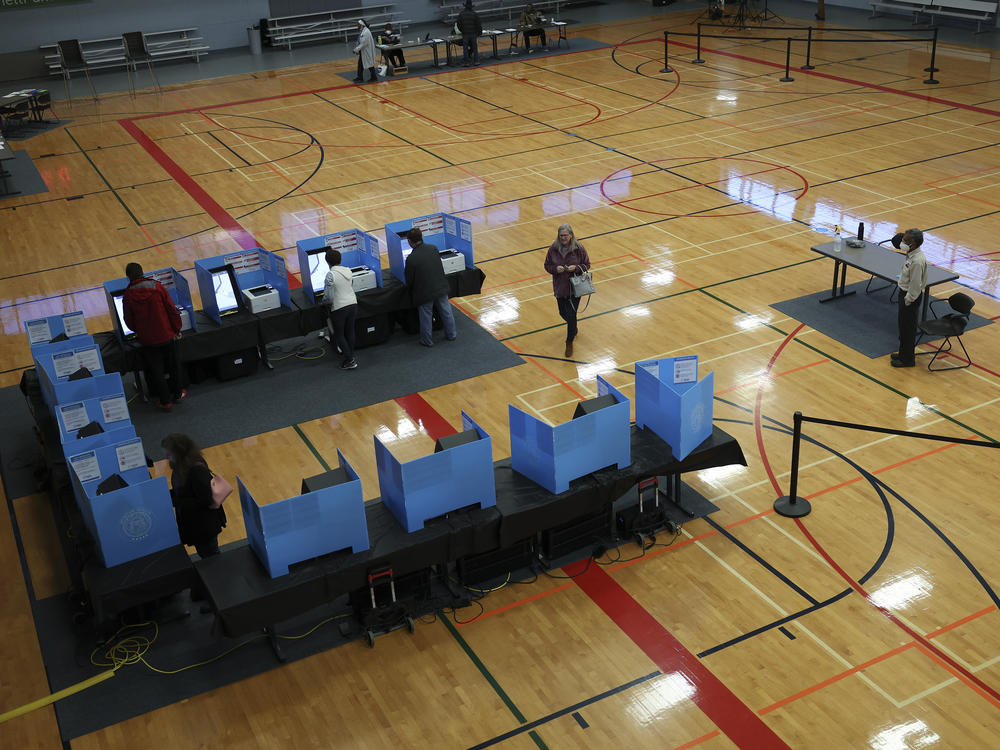Section Branding
Header Content
Georgia lawmakers add to the growing list of bans on outside election funding
Primary Content
ATLANTA — Georgia Republican lawmakers approved a measure last week that would outlaw local officials from seeking almost all third-party funding to help cover the costs of running elections.
GOP-led Arkansas recently enacted a similar ban on outside money in elections.
The bills are the latest in a series of measures passed by Republicans at the state level to crack down on outside funding in elections. Their efforts have been fueled in part by false claims about the 2020 election and come as election officials across the country complain about persistent funding needs.
Georgia's Senate Bill 222 would make it a felony for local election workers or government officials to solicit or accept money to cover the cost of running elections from any source other than the state or federal government.
In 2021, Georgia lawmakers passed a sweeping 98-page voting overhaul that banned county elections boards from directly receiving outside funding, instead requiring any grant money to be requested and disbursed by county governments.
But after majority-Black, Democratic-heavy DeKalb County in metro Atlanta received a $2 million grant in early 2023 that it then allocated to its elections office, some conservative groups pressured the General Assembly to close this loophole and make that method illegal, too. The legislation SB 222 is now at the governor's desk.
Some Republicans have argued, without evidence, that money given to elections offices has improperly influenced electoral outcomes. In Georgia and around the country in 2020, Democratic- and Republican-leaning counties alike received millions in nonprofit grants to help administer elections during the pandemic, with more of the money going to counties that had more voters. Many conservatives complained that much of the money came from the founder of Facebook and his wife in the form of donations to the nonprofit Center for Tech and Civic Life, and helped facilitate mail voting. Soon after that election, GOP-led states began banning outside funding.
"Schemes to privatize our elections have no place in Georgia or anywhere else and undermine the confidence of voters who have doubts about the legitimacy and accuracy of our elections and whether they were conducted with fairness and honesty," Ken Cuccinelli, a former Trump administration official who's now with the Election Transparency Initiative, said in a statement about the new Georgia bill.
Democrats and voting rights groups have attacked the move as short-sighted and likely increasing the financial burden on local elections offices that have seen an exodus of staffing after recent grueling election cycles.
"Election grants are not the problem, there's simply no evidence of it," Democratic state Rep. Saira Draper said during debate on the bill. "The real problem is cutting off lifelines to our chronically underfunded elections offices."
DeKalb County officials said the $2 million grant money would go toward things like upgrading office facilities. There are no major elections scheduled in Georgia in 2023.
Earlier versions of SB 222 would have sought to force DeKalb County to return that funding to the nonprofit U.S. Alliance for Election Excellence, but that language was removed after Democratic lawmakers said that making the grant retroactively illegal would have violated the Constitution.
The ban does not apply to groups such as churches that donate locations to serve as polling places, "services provided by individuals without remuneration" or goods with a value of less than $500.
"Our election infrastructure is chronically underfunded"
Nearly half of U.S. states have enacted some limit on private funding in elections since the 2020 cycle, according to the National Conference of State Legislatures. The measures typically prevent local governments and election offices from seeking any third-party funding, though some states do set out parameters for uniform distribution of funds given to the state government.
Last month, Republican Arkansas Gov. Sarah Huckabee Sanders signed SB255, which further amends that state's outside funding restriction to more explicitly prevent local governments from using such funding.
In a U.S. Senate hearing last week, Democratic New Mexico Secretary of State Maggie Toulouse Oliver told lawmakers of dire staffing shortages because of threats against election workers, and highlighted election offices' needs for more resources to upgrade things like equipment and technology.
"Sufficient funding for election administration, however, remains an obstacle for many election offices across the country," she said. "The federal government can help states and their election administrators by providing consistent, robust funding streams."
That echoed a call from the Alliance for Securing Democracy and the group Issue One in a recent report laying out policy recommendations for the 2024 elections.
"Nearly all the recommendations in this report connect to the persistent lack of sufficient federal funding for local and state election administration," the authors wrote. "Our election infrastructure is chronically underfunded, forcing creative election officials to scramble every year to run safe, smooth, and secure elections."
The requests for more money to fund elections is a bipartisan issue, too. Georgia Secretary of State Brad Raffensperger, a Republican, asked state budget writers for more money to cover the cost of an absentee ballot tracking service, data for polling place check-in tablets and $4 million to replace heavy battery backup power supplies for voting machines.
"The current [backup] is a lead-based battery, it's robust, it also weighs 80 pounds," Raffensperger said in a budget hearing earlier this year. "Our average poll worker has an age of over 65 years old, it's a burden."
Georgia lawmakers declined to add the $4 million to replace the equipment and many of Raffensperger's other requests in either budget approved this legislative session.
Copyright 2023 Georgia Public Broadcasting. To see more, visit Georgia Public Broadcasting.
Bottom Content




